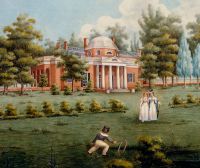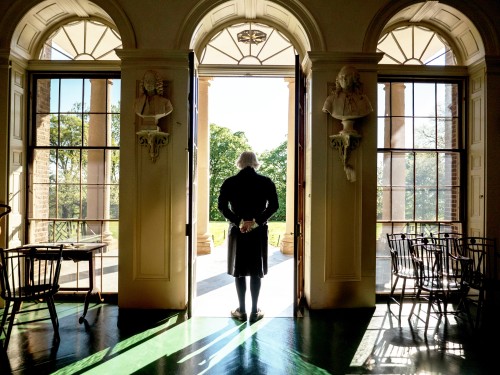Following Jefferson's death in 1826, his granddaughter Virginia Randolph Trist wrote letters containing "all my childish recollections of my dear grandfather." The passage below describes games with "grandpapa."
 "One of our earliest amusements was in running races on the terrace, or around the lawn. He placed us according to our ages, giving the youngest and smallest the start of all the others by some yards, and so on; and then he raised his arm high, with his white handkerchief in his hand, on which our eager eyes were fixed, and slowly counted three, at which number he dropped the handkerchief, and we started off to finish the race by returning to the starting-place and receiving our reward of dried fruit -- three figs, prunes, or dates to the victor, two to the second, and one to the lagger who came in last."
"One of our earliest amusements was in running races on the terrace, or around the lawn. He placed us according to our ages, giving the youngest and smallest the start of all the others by some yards, and so on; and then he raised his arm high, with his white handkerchief in his hand, on which our eager eyes were fixed, and slowly counted three, at which number he dropped the handkerchief, and we started off to finish the race by returning to the starting-place and receiving our reward of dried fruit -- three figs, prunes, or dates to the victor, two to the second, and one to the lagger who came in last."
"A Grave Man Can Play the Fool"
Mrs. Margaret Bayard Smith, who visited Monticello in August of 1809, remembered watching the grandchildren's races with Jefferson:
[After the races] the little girls . . . came panting and out of breath to throw themselves into their grandfather's arms, which were opened to receive them; he pressed them to his bosom and rewarded them with a kiss; he was sitting on the grass and they sat with him, untill they were rested. . . . 'What an amusement,' said I, 'do these little creatures afford us.' 'Yes,' replied he, 'it is only with them that a grave man can play the fool.' They now called on him to run with them, he did not long resist and seemed delighted in delighting them.
For more information about Jefferson's relationship with his family check out the Jefferson Quotes and Family Letters Website. Also consider Sarah N. Randolph's The Domestic Life of Thomas Jefferson, or The Family Letters of Thomas Jefferson, edited by Edwin Morris Betts and James A. Bear, Jr. Mrs. Smith's recollections are recorded in part in Domestic Life, and more fully in a gathering of her writings, The First Forty Years of Washington Society.
